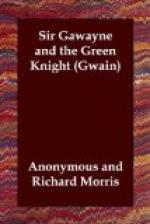XX.
444 For þe hede in his honde he
halde3 vp euen,
[A] To-ward þe derrest on þe dece he dresse3
þe face,
& hit lyfte vp þe y3e-lydde3, & loked ful
brode,
[B] & meled þus much with his muthe, as 3e may
now here.
448 “Loke, Gawan, þou be grayþe to go as
þou hette3,
& layte as lelly til þou me, lude, fynde,
[C] As þou hat3 hette in þis halle, herande þise
kny3tes;
[D] To þe grene chapel þou chose, I charge þe
to fotte,
452 Such a dunt as þou hat3 dalt disserued þou
habbe3,
[E] To be 3ederly 3olden on nw 3eres morn;
Þe kny3t of þe grene chapel men knowen me
mony;
[F] For-þi me forto fynde if þou frayste3, fayle3
þou neuer,
456 [G] Þer-fore com, oþer recreaunt be calde þe
be-houeus.”
With a runisch rout þe rayne3 he torne3,
[H] Halled out at þe hal-dor, his hed in his
hande,
Þat þe fyr of þe flynt fla3e fro fole houes.
460 To quat kyth he be-com, knwe non þere,
Neuermore þen þay wyste fram queþen. he wat3
wonnen;
what þenne?
Þe kyng & Gawen þare,
464 [I] At þat grene þay la3e & grenne,
3et breued wat3 hit ful bare,
A meruayl among þo menne.
[Sidenote A: The head lifts up its eyelids,]
[Sidenote B: and addresses Sir Gawayne; “Look
thou, be ready to go as thou
hast promised,]
[Sidenote C: and seek till thou findest me.]
[Sidenote D: Get thee to the Green Chapel,] [Sidenote
E: there to receive a blow on New Year’s
morn.] [Sidenote F: Fail thou never;] [Sidenote
G: come, or recreant be called.”] [Sidenote
H: The Green Knight then rushes out of the hall,
his head in his
hand.]
[Sidenote I: At that green one Arthur and Gawayne
“laugh and grin.”]
XXI.
[A] Þa3 Arþer þe hende kyng at
hert hade wonder,
468 He let no semblaunt be sene, bot sayde ful
hy3e
To þe comlych quene, wyth cortays speche,
[B] “Dere dame, to day demay yow neuer;
Wel by-commes such craft vpon cristmasse,
472 Laykyng of enterlude3, to la3e & to syng.
Among þise, kynde caroles of kny3te3 & ladye3;
[C] Neuer-þe-lece to my mete I may me wel dres,
For I haf sen a selly, I may not for-sake.”
476 He glent vpon sir Gawen, & gaynly he sayde,
[D] “Now sir, heng vp þyn ax, þat hat3
in-nogh hewen.”
& hit wat3 don abof þe dece, on doser to
henge, [Fol. 97b.]
Þer alle men for meruayl my3t on hit loke,
480 & bi trwe tytel þer-of to telle þe wonder.
[E] Þenne þay bo3ed to a borde þise burnes to-geder,
Þe kyng & þe gode kny3t, & kene men hem serued
Of alle dayntye3 double, as derrest my3t
falle,
484 Wyth alle maner of mete & mynstralcie boþe;
Wyth wele walt þay þat day, til worþed an
ende,
in londe.
[F] Now þenk wel, sir Gawan,
488 For woþe þat þou ne wonde,
Þis auenture forto frayn,
Þat þou hat3 tan on honde.




